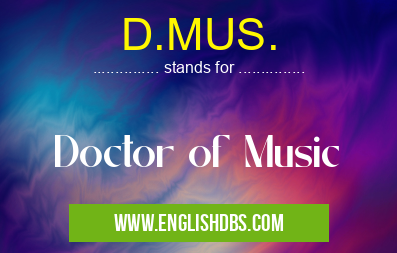What does D.MUS. mean in ACADEMIC DEGREES
D.MUS. is an abbreviation for Doctor of Music, which is an academic degree at the doctoral level and is usually awarded in disciplines that involve the study and performance of music. This degree offers advanced studies in music theory, composition, arranging, music production and other topics related to the world of music. With a Doctorate in Music, students can go on to pursue successful careers as performing professionals, composers, conductors, teachers and researchers. It is important to note that different schools may have different requirements for this degree so it's best to talk with your program’s faculty about what will be expected of you in order to complete the program successfully.

D.MUS. meaning in Academic Degrees in Academic & Science
D.MUS. mostly used in an acronym Academic Degrees in Category Academic & Science that means Doctor of Music
Shorthand: D.MUS.,
Full Form: Doctor of Music
For more information of "Doctor of Music", see the section below.
Benefits Of A D.MUS Degree
Holding a D.MUS degree gives graduates an advantage when looking for employment opportunities within the field of music since many employers prefer applicants who have completed some form of higher education or training specific to their field. Additionally, having achieved such a high level of academic qualification can often open up previously inaccessible opportunities particularly when seeking funding or grants related to any kind of musical project.
Essential Questions and Answers on Doctor of Music in "SCIENCE»DEGREES"
What does a D.Mus. degree signify?
A Doctor of Music (D.Mus.) degree is a specialized program that focuses on advanced coursework and research within the field of music. The degree can be completed in two to four years depending on the program requirements and can be obtained from accredited universities or conservatories.
What does a student need to qualify for a D.Mus.?
To qualify for a Doctor of Music degree, applicants typically need to have either a master’s degree in music or an equivalent level of education, as well as experience with scholarly research and/or teaching experience. In most cases, prospective students will also need to submit an audition.
What are the benefits of pursuing a D.Mus.?
By completing a Doctor of Music program, graduates often gain advanced knowledge in their specialty area, increased credibility in their field, enhanced access to prestigious music research programs and opportunities, and overall professional growth.
Are there any specializations available in a D.Mus.?
Yes - many institutions offering Doctor of Music degrees provide specializations within their programs such as performance, composition, conducting, voice pedagogy/performance studies, musicology/ethnomusicology, music technology or sacred music. Prospective students should investigate specific curriculums thoroughly before starting an application process.
Do employers recognize the value of a D.Mus.?
Yes - professional musicians who have earned the D.Mus can obtain enhanced job prospects within their chosen field while those who wish to pursue teaching roles at universities can also benefit from their credentials when applying for faculty positions.
What kind of career paths are possible with a D.Mus.?
A Doctoral Degree in Music can open up many career paths including college faculty positions such as professor or lecturer; professional musician; conductor; church musician; administration roles; recording engineer; composer/arranger; education director or consultant; private instructor/tutor; sound designer; and multimedia specialist.
Are there differences between the various Doctoral Programs?
Yes - each institution offering Doctoral Programs may have different requirements for obtaining the degree such as number of credits needed or skills required for completion so it is important for prospective students to closely investigate all programs before selecting one that best suits their individual goals.
Are online programs available?
Yes - there are several online programs available which offer flexibility and convenience for those who want to further their studies but cannot attend full-time classes due to work commitments or other time constraints.
Is financial assistance available?
Financial aid may be available through grants, scholarships or loans depending on the institution offering the program you choose so it is important to speak with your school about what options may be applicable for your situation.
Final Words:
Achieving a Doctorate in Music allows students the opportunity not only to fully immerse themselves in their passions but also bear witness their own growth over time developing both academically as well as personally while honing skills that they can then carry with them into professional life later on down the line. Overall, obtaining a D.MUS degree can be highly beneficial both practically and emotionally for those passionate about making music their career path.
